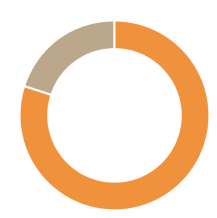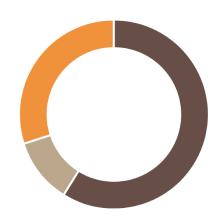Are you a cyber-chondriac? | The problem with online self diagnosis
The dangers of Googling medical advice, and the complexity of self diagnosis.
With a global pandemic dominating conversations around the world, it’s little surprise that three of the top five UK Google search results in 2020 were related to Coronavirus, including “coronavirus symptoms”.
We’re all guilty of turning to the internet with a quick health question once in a while, but to what extent can we trust the results?
Dr Google
With the availability of face-to-face GP appointments still not back up to pre-pandemic levels, there’s a worrying potential for more and more people to self diagnose all manner of conditions by turning to search engines like Google for answers.
While the online giant may not disclose its search volume, estimates suggest that Google processes around 63,000 queries every second – a staggering 5.5 billion per day.
So, there’s no doubt that search engines can turn up a vast quantity of information, but the problem is it lacks discernment.
It’s easy to find health-related results that sound like our symptoms, but we don’t have the medical training and experience to make an informed diagnosis. Your Doctor or nurse practitioner would take multiple considerations into account, not least personal and family history, and other likely contributing factors; Google doesn’t have the capacity to analyse results in such a way, however clever its algorithm may be.
The diagnosis of any condition is complex and requires expert, human input.
It’s also important to remember that while top-ranking sites may seem temptingly trustworthy, a professional looking website and an authoritative-sounding domain name denote only web design skills and SEO knowledge – not medical expertise.
“A valuable source of medical information. However…”
Many doctors report that their patients are simply too ready to believe online health advice, while a study by The University of Surrey found that online searches can fuel health anxiety. Dr Afrodita Marcu, Research Fellow at the University of Surrey, says: "The internet is a valuable source of medical information. However, it also contains a lot of poor quality information, or information which cannot be easily interpreted by lay people or applied to an individual situation, so it is not surprising that some people feel they cannot trust it.
"The way that a person will capitalise on the internet for health purposes depends on many factors, like the nature of their symptoms or their fear about coming across misleading information, so we should not assume that 'Dr Google' is valuable and credible to all."
The spiral of searching
Searching one symptom or ailment can soon lead to a false diagnosis, and then another search, and another... until you unwittingly head down a rabbit hole of unwarranted anxiety. In fact, this has become such a common occurrence that psychologists have coined the term: cyberchondria - when your anxiety increases by leaping to dire conclusions while researching health matters online.
A 2008 Microsoft study suggested that self-diagnosis by search engine frequently led web searchers to conclude the worst about what ails them. In fact, the study found that searches for things like headache and chest pain were just as likely (or more likely) to lead to pages describing serious conditions as benign ones, even though the serious illnesses are much more rare.
For example, there were just as many results linking headaches with brain tumours as with caffeine withdrawal.
If you must search symptoms and treatments online, try to stick to official NHS guidance.
Step away from the screen and pick up the phone
Don’t simply assume that you won’t get an appointment with your GP or Nurse Practitioner. Calling your local health centre should be your first port of call, and they will advise on next steps.
Analysis of NHS Digital data in this BBC article shows significant regional variation in the availability of face-to-face appointments, with some areas seeing less than half in-person, but others closer to 75%.
Plus, with many many health issues, a phone or digital appointment can be just as effective as meeting in person, answering your questions in a much more full and informed way than you would find online.
GPs have said rising demand and shortages of staff meant they were struggling to see more people face-to-face. But in more hopeful news, the 2021 Budget announced billions of pounds in additional funding to cut waiting lists and increase NHS capacity in the near future.
Another route to medical advice
As well as phoning your local GP surgery, GoodShape members also have the option to call our nurse-triage service.
Our absence management system includes a unique 24/7 nurse-led service, which helps businesses ensure that staff always get the right medical advice. Callers can speak to our team of Registered Nurses, who ensure their symptoms are properly assessed, and signpost to treatment at the critical moment.
Professional (human!) advisors are available all day every day, and in 2020, we potentially saved someone’s life more than once every day. 26% of those life-threatening ‘Code Red’ calls were due to mental health crises. And around half of them came outside of office hours when worried patients might otherwise have turned to the internet.
In recent years, GoodShape has also averted a number of serious incidents among employees who had incorrectly self-diagnosed an illness, often via the internet. Several of these callers were at risk of overdosing on medication, and a number had already done so, highlighting another risk of relying on online advice.
Keeping people and business in GoodShape
Employers need to take a leading role in promoting good mental and physical health. Creating a culture where staff can access the right advice at the right time benefits businesses in a multitude of ways, from boosting morale and engagement to reducing costs and increasing productivity. Correct medical advice at the right time, doesn’t just ensure accurate medical assessment. It can also pave the way for a swift return to work.
Businesses that provide access to accurate medical advice are not only safeguarding their staff – they’re also securing their future. The best performing organisations know this, and are putting steps in place to give employees an alternative to Dr Google.
“We have been using the GoodShape service since 2007”

Lorem ipsum dolor
sit amet, consectetuer
adipiscing.

Lorem ipsum dolor
sit amet, consectetuer
adipiscing.
Find out how we can help.
Fill out the form below and one of our team will be in touch to arrange a meeting.



